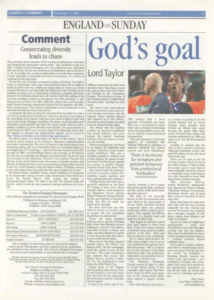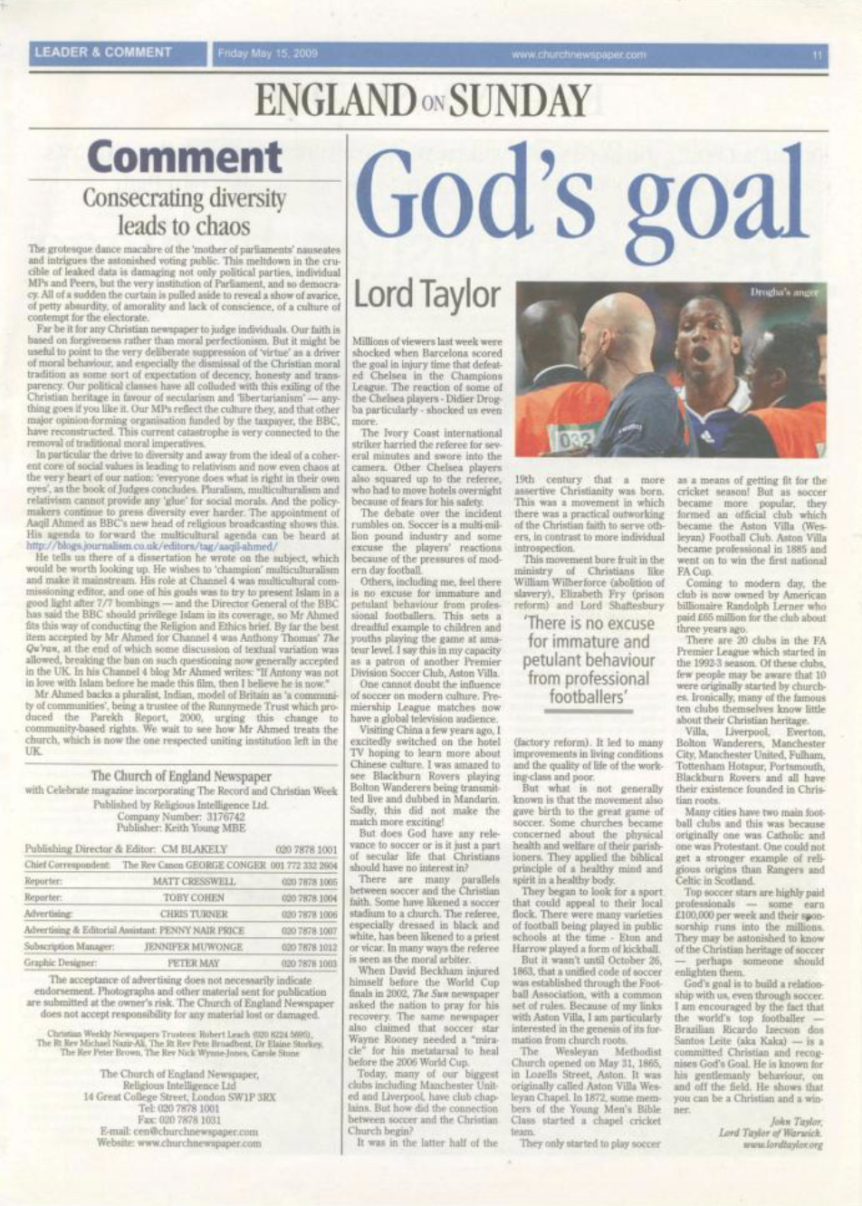Church of England Article By Lord Taylor of Warwick
 Millions of viewers last week were shocked when Barcelona scored the goal in injury time that defeated Chelsea in the Champions League. The reaction of some of the Chelsea players – Didier Drogba particularly – shocked us even more.
Millions of viewers last week were shocked when Barcelona scored the goal in injury time that defeated Chelsea in the Champions League. The reaction of some of the Chelsea players – Didier Drogba particularly – shocked us even more.
The Ivory Coast international striker harried the referee for several minutes and swore into the camera. Other Chelsea players also squared up to the referee, who had to move hotels overnight because of fears for his safety.
The debate over the incident fumbles on. Soccer is a multi-million pound industry and some excuse the players’ reactions because of the pressures of modern day football.
Others, including me, feel there is no excuse for immature and petulant behaviour from professional footballers. This sets a dreadful example to children and youths playing the game at amateur level. I say this in my capacity as a patron of another Premier Division Soccer Club, Aston Villa.
One cannot doubt the influence of soccer on modern culture. Premiership League matches now have a global television audience.
Visiting China a few years ago. I excitedly switched on the hotel TV hoping to learn more about Chinese culture. I was amazed to see Blackburn Rovers playing Bolton Wanderers being transmitted live and dubbed in Mandarin. Sadly, this did not make the match more exciting!
But does God have any relevance to soccer or is it just a part of secular life that Christians should have no interest in?
There are many parallels between soccer and the Christian faith. Some have likened a soccer stadium to a church. The referee, especially dressed in black and white, has been likened to a priest or vicar. In many ways the referee is seen as the moral arbiter.
When David Beckham injured himself before the World Cup finals in 2002. The Sun newspaper asked the nation to pray for his recovery. The same newspaper also claimed that soccer star Wayne Rooney needed a “miracle” for his metatarsal to heal before the 2006 World Cup.
Today, many of our biggest clubs including Manchester United and Liverpool, have club chaplains. But how did the connection between soccer and the Christian Church begin?
It was in the latter half of the 19th century that a more assertive Christianity was born. This was a movement in which there was a practical outworking of the Christian faith to serve others, in contrast to more individual introspection.
This movement bore fruit in the ministry of Christians like William Wilberforce (abolition of slavery), Elizabeth Fry (prison reform) and Lord Shaftesbury (factory reform). It led to many improvements in living conditions and the quality of life of the working-class and poor.
But what is not generally known is that the movement also gave birth to the great game of soccer. Some churches became concerned about the physical health and welfare of their parishioners. They applied the biblical principle of a healthy mind and spirit in a healthy body.
They began to look for a sport that could appeal to their local flock. There were many varieties of football being played in public schools at the time. Eton and Harrow played a form of kickball.
But it wasn’t until October 26, 1863, that a united code of soccer was established through the Football Association, with a common set of rules. Because of my links with Aston Villa, I am particularly interested in the genesis of its formation from church roots.
The Wesleyan Methodist Church opened on May 31, 1865, in Lozells Street, Aston. It was originally called Aston Villa Wesleyan Chapel. In 1872, some members of the Young Men’s Bible Class started a chapel cricket team.
They only started to play soccer as a means of getting fit for the cricket season! But as soccer became more popular, they formed an official club which became the Aston Villa (Wesleyan) Football Club. Aston Villa became professional in 1885 and went on to win the first national FA Cup.
Coming to modern day, the club is now owned by American billionaire Randolph Lerner who paid £65 million for the club about three years ago.
Update note: “The club is currently 2017 owned by Recon Group Limited, a company chaired by Chinese businessman Tony Xia, and managed by Steve Bruce.”
There are 20 clubs in the FA Premier League which started in the 1992-3 season. Of these clubs, few people may be aware that 10 were originally started by churches. Ironically, many of the famous ten clubs themselves know little about their Christian heritage.
Villa, Liverpool, Everton, Bolton Wanderers, Manchester City, Manchester United, Fulham, Tottenham Hotspur, Portsmouth, Blackburn Rovers and all have their existence founded in Christian roots.
Many cities have two main football clubs and this was because originally one was Catholic and one was Protestant. One could not get a stronger example of religious origins than Rangers and Celtic in Scotland.
Top soccer stars are highly paid professionals – some earn £100,000 per week and their sponsorship runs into the millions. They may be astonished to know the Christian heritage of soccer – perhaps someone should enlighten them.
God’s goal is to build a relationship with us, even through soccer. I am encouraged by the fact that the world’s top footballer – Brazilian Ricardo Izecson dos Santos Leite (aka Kaka) – is a committed Christian and recognises God’s Goal. He is known for his gentlemanly behaviour, on and off the field. He shows that you can be a Christian and a winner.
